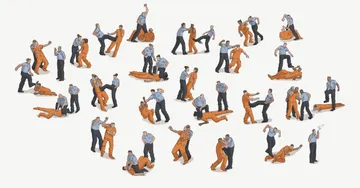It’s that time of year, when presidents and governors throw open the doors of the nation’s prisons and free some lucky inmates in the spirit of Christmas beneficence and holiday forgiveness. President Barack Obama reinforced that notion last week when he reduced the sentences of 95 people, mostly nonviolent drug offenders.
But the idea of Christmas mercy, so lodged in popular culture, is a bit of a myth.
For starters, most acts of holiday clemency are pardons, not commutations. A pardon is a restoration of someone’s rights and privileges — often to vote, get a business license, or buy a firearm — usually after someone has completed a prison sentence. An early release from prison is a commutation.
To be sure, modern presidents grant more clemency — both pardons and commutations — in December than in any other month. At its most extreme, former President Richard Nixon granted clemency to 643 people over his five Decembers in office (then he needed his own pardon). Compare that to the 274 he made in all other months combined. Between Nixon and former President George W. Bush, one in every two acts of presidential clemency was made around the winter holidays.
But most recent presidents have granted far more pardons than commutations. The last president to top Obama’s total of 184 commutations was Lyndon B. Johnson.
At the state level, commutations — and sending people home in time for Christmas — are rare, said former U.S. pardon attorney Margaret Colgate Love. Unlike the federal system, most states already have mechanisms to release people early — parole boards — and most people serving long sentences are in for violent crime.
Some governors issue pardons in December, but practices vary considerably from state to state and the structures in place often stave off Christmas clemency.
Love said pardoning is a fairly regular, year-round occurrence in about 15 states. About a dozen of those, including Delaware and Pennsylvania, have a mechanism in place that makes pardoning a regular feature of the justice system, not just something that happens at Christmas. One often effective structure is a board that oversees the application process, holds hearings, and forwards requests to the governor for final approval.
While not handing out many Christmas commutations, a few current governors become merciful pardoners over the holidays. California Gov. Jerry Brown is known for it. He pardoned batches near Good Friday and Christmas last year and near Easter this year. Illinois Gov. Bruce Rauner issued pardons this year in time for Easter, Independence Day, and Thanksgiving. Even New York Gov. Andrew Cuomo, a particularly stingy pardoner, said his new clemency initiative announced on Sunday was inspired in part by the holiday season.
If you’re in favor of pardoning, it’s hard at a glance to argue with a Christmas pardon. But some of the most ardent supporters of clemency are at best lukewarm about them.
“The more they are concentrated on a holiday time and seen as a holiday occurrence, the less they play the justice-designed role that our founding fathers intended,” says Love, the former pardon attorney. “Whatever it takes to get governors and presidents to pardon, but holidays are not my favorite reason.”
Former Maryland Gov. Robert Ehrlich, who granted pardons regularly, says he instructs new governors not to pardon at Christmas. “If you think somebody is not enjoying their full rights for no good reason, why wait ‘til a holiday?” he said.
So why pardon around the holidays at all? In his article on presidential clemency, P.S. Ruckman Jr., a political scientist and author of the Pardon Power blog, suggests a few reasons: Executives may not get around to reviewing clemency applications until the end of the year. They may be influenced by the spirit of the Bible. Most cynically, December may just be a convenient moment to slip an unpopular act under the rug, especially for politicians ending their final term in office.
But Ehrlich says it’s pretty simple. Asked why presidents and governors tend to be merciful at this time of year, he laughs, “Well, it’s Christmas!”
